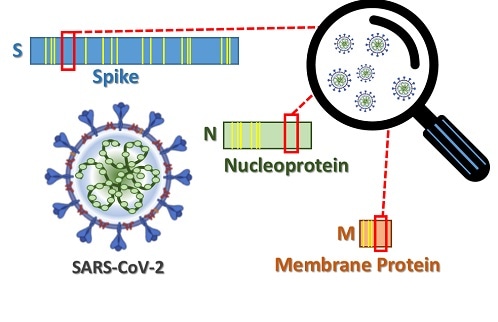SPI researchers (Marcoule) used proteomics to identify signature peptides of the SARS-CoV-2 virus expressed in vitro. A "short list" of 14 identified and characterized peptides allows to consider developments in targeted mass spectrometry, making this direct and rapid large-scale approach, implantable in hospitals, a potential tool of choice in the detection of the virus responsible for Covid-19.

Scheme representing the S (spike), M (membrane protein) and N (nucleoprotein) main structural proteins of SARS-CoV-2, from which 14 peptides have been identified and characterized. Image Credit: Jean Armengaud/CEA
Abstract
Detection of severe acute respiratory syndrome coronavirus 2 (SARS-CoV-2) is a crucial tool for fighting the COVID-19 pandemic. This dataset brief presents the exploration of a shotgun proteomics dataset acquired on SARS-CoV-2 infected Vero cells. Proteins from inactivated virus samples were extracted, digested with trypsin, and the resulting peptides were identified by data-dependent acquisition tandem mass spectrometry.
The 101 peptides reporting for six viral proteins were specifically analyzed in terms of their analytical characteristics, species specificity and conservation, and their proneness to structural modifications. Based on these results, a shortlist of 14 peptides from the N, S, and M main structural proteins that could be used for targeted mass-spectrometry method development and diagnostic of the new SARS-CoV-2 is proposed and the best candidates are commented.
Source:
Journal reference:
Gouveia, D., et al. (2020) Shortlisting SARS‐CoV‐2 Peptides for Targeted Studies from Experimental Data‐Dependent Acquisition Tandem Mass Spectrometry Data. Proteomics. doi.org/10.1002/pmic.202000107.